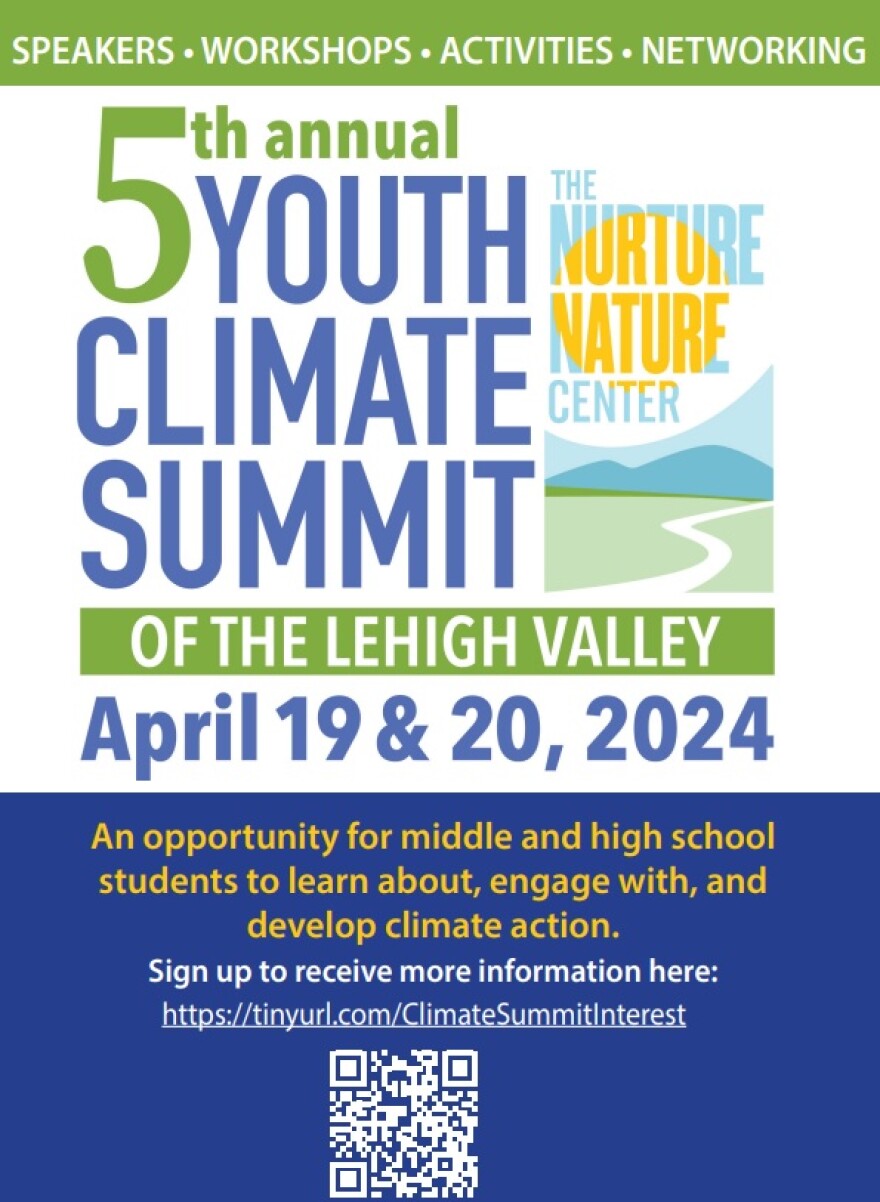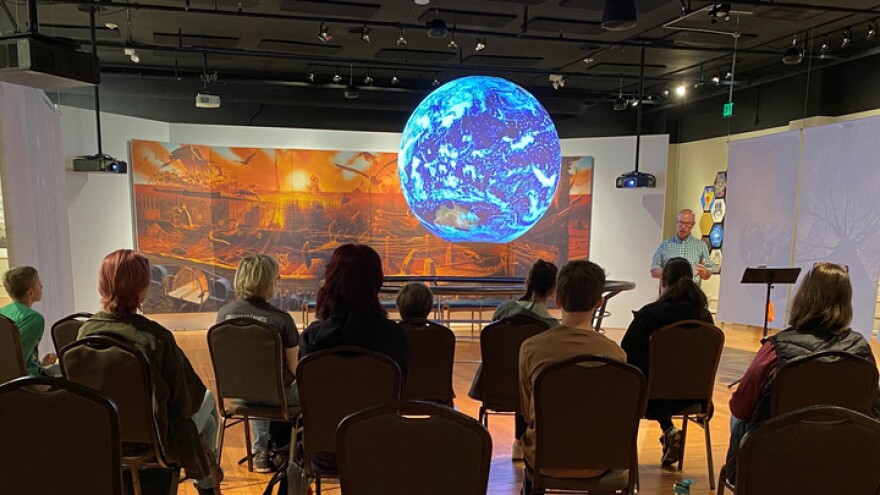EASTON, Pa. — Students across the Lehigh Valley crave climate education, as well as an opportunity to be part of the solution, Kathryn A. Semmens said, and the Nurture Nature Center wants to help.
“There's a lot that is being done, and we want to highlight that, but we also want to raise the awareness that there is interest in this from youth — they want to do something, they want to get involved,” said Semmens, the center’s science director. “It is their future, so having them feel empowered and getting engaged is really important.”
For the fifth year, the center is hosting the Youth Climate Summit of the Lehigh Valley, a free event that aims to engage middle and high school students in climate change issues, as well as seek solutions.
Set for April 19 and 20 at the center, 518 Northampton St., Easton, organizers said a federal grant has helped expand the event, with the hope of attracting teachers and students from across the region.
“We are trying to help connect all of the teachers and students who are interested in this, who are trying to make headway on this issue and educate about this issue. And we see that there's this need, this gap for a place to bring people together that are doing that work and trying to bring up education about it.”Kathryn A. Semmens, Nurture Nature Center's science director
“We are trying to help connect all of the teachers and students who are interested in this, who are trying to make headway on this issue and educate about this issue,” Semmens said. “And we see that there's this need, this gap for a place to bring people together that are doing that work and trying to bring up education about it.”
‘Angry, powerless, helpless’
Schools across the U.S., especially in Pennsylvania, have fallen behind when it comes to climate education, even as researchers show students worldwide are concerned about how climate change will impact their lives.
Only a third of U.S. teachers said science-related topics such as climate action, clean water and clean energy appear in their curriculum, compared to roughly three-quarters of teachers in Brazil, according to a spring 2023 survey conducted by the Smithsonian Science Education Center in collaboration with Gallup Inc.
The survey also found teachers in India, Canada, France and Brazil were more than three times as likely as U.S. teachers to say they have the necessary support to incorporate sustainable development topics into other subjects.
A study published in December 2021 in The Lancet, a peer-reviewed medical journal, found that the majority of young people, ages 16 to 25, across 10 countries are either extremely or moderately worried about climate change.
More than 45% of respondents said their feelings about climate change negatively affected their daily life and functioning, and many reported a high number of negative thoughts about climate change.The Lancet
“More than 50% reported each of the following emotions: sad, anxious, angry, powerless, helpless and guilty,” according to the study.
“More than 45% of respondents said their feelings about climate change negatively affected their daily life and functioning, and many reported a high number of negative thoughts about climate change, e.g. 75% said that they think the future is frightening and 83% said that they think people have failed to take care of the planet.
“Respondents rated governmental responses to climate change negatively and reported greater feelings of betrayal than of reassurance.”
While neighboring New Jersey in 2020 became the first state in the U.S. to mandate teachers cover climate change in all subjects beginning in kindergarten, Pennsylvania has no such requirement.
That same year, House Bill 2795 died in committee – the law would have required the commonwealth's public schools to provide instruction on climate change – and the commonwealth received a failing grade from the National Center for Science Education in its study, “Making The Grade? How State Public School Science Standards Address Climate Change.”
However, the state Board of Education in January 2022 adopted new standards for science, technology and engineering, as well as environmental literacy and sustainability. The previous standards, set in 2002, are set to expire June 30, 2025, leaving commonwealth schools with three years to fully integrate the new standards into classroom instruction.
The update was necessary, officials argued in the BOE’s 2022 report, “to align the standards with current research and best practices in learning and teaching science that prioritize a shift away from memorization of facts to having student productively participate in scientific discourse and practices, involving students in a sustained investigation to support deeper understanding, and recognizing that even young children are capable of more sophisticated scientific reasoning than originally thought.”
What's your climate superpower?
This year’s summit is the first to be supported with grant funding, Semmens said, and officials are hoping to use the money to expand the event.
“We are definitely getting to be much bigger this year than we have been in the past, and anticipating we’ll have satellite events from schools all across the region,” she said. “Even down into Bucks and throughout the Lehigh Valley and then, of course, we have in-person events [at the center] on those two days as well.”
The center last year was awarded $499,874 from the National Oceanic and Atmospheric Administration for its CREATE Connections project, an effort to engage all community members in addressing climate change. The grant is earmarked to also fund events at libraries in Easton and Bethlehem and six undergraduate internships at the center, as well as other initiatives.
About $5,000 will be used for the summit over the next four years.
This year’s summit will include a climate fair, career panel, bike rides in collaboration with Community Bike Works, a tree planting and more. Diane Husic, a biology professor at Moravian University, as well as the university’s dean of the center for scholarship, research and creative endeavors, is slated to give a keynote about empowering youth engagement in climate action.

Participants will also be asked to discover their “climate superpower,” officials said.
“The idea of climate superpowers is that there's a role for everybody and it takes everybody to take climate action,” said Lauren Fosbenner, the center’s project specialist.
“The superpowers are about having the students think about their strengths, think about the things they're interested in, and match that up with types of action that would suit them, that they would enjoy and be able to engage in after the climate summit,” she said.
For more information, go to Nurture Nature Center’s website. Students and teachers can register to attend the summit here.


